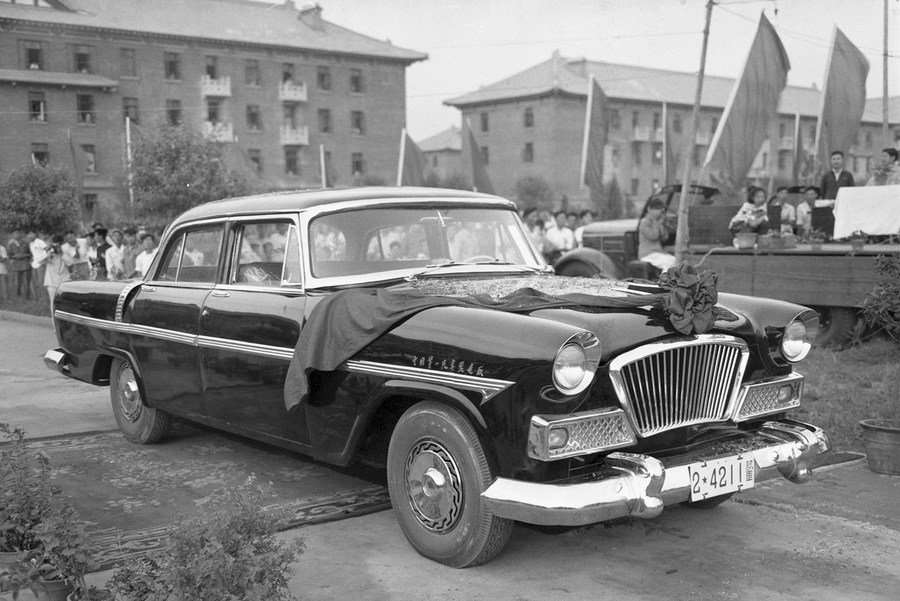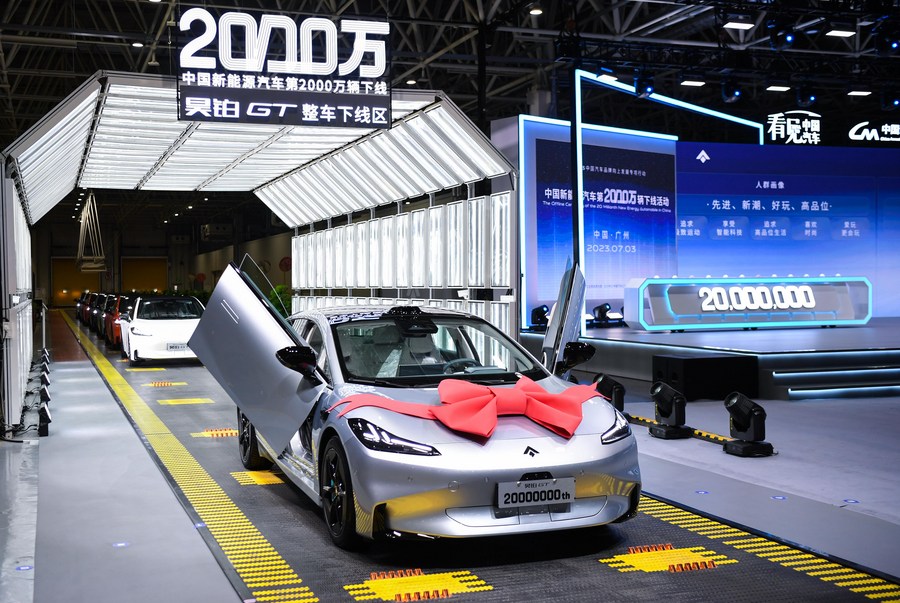
 Your current location:
Your current location:
* China's auto production and sales have ranked first in the world for 14 consecutive years, and those of NEVs topped the global market for the eighth year in a row.
* As China's auto industry is going through a transformation of unprecedented magnitude, traditional automakers are revving up NEV production.
* Some domestic NEV brands, such as BYD, have gained a foothold in overseas markets.
CHANGCHUN, July 14 (Xinhua) -- At a smart factory of China's leading automaker FAW Group Co., Ltd., over one hundred automated guided vehicles shuttle back and forth, while vision-guided robots apply silicone sealants on car windows, just like in a sci-fi movie.
A rare scene in the past, this is now a common sight at the FAW Jiefang J7 complete-vehicle smart factory in Changchun City, northeast China's Jilin Province.
The construction of the First Automotive Works, China's first automotive manufacturing plant and predecessor of FAW Group Co., Ltd., was launched in Changchun on July 15, 1953, marking the beginning of the nation's auto industry.
From its first car rolling off the production line to being one of the world's top 500 companies, the FAW has become the epitome of China's auto industry development.
Showing resilience and a strong momentum of rapid development, China's auto production and sales have ranked first in the world for 14 consecutive years, and those of new energy vehicles (NEVs) topped the global market for the eighth year in a row.
Particularly, China's vehicle exports soared to around 1.07 million units in the first quarter of 2023, data from the General Administration of Customs showed, indicating that China had become the world's largest auto exporter in the period, outpacing Japan.
INTELLIGENT AND DIGITAL EMPOWERMENT
By the end of 2022, the FAW had produced and sold more than 54 million vehicles and achieved an operating revenue of over 7.9 trillion yuan (about 1.1 trillion U.S. dollars), an achievement that 92-year-old Dou Shuxiang, who retired from FAW, had never imagined.
When the FAW was first established, the workers used hammers to make doors, roofs, and wheels as they had no relevant information or experience.
"To build a car, we must build the car body first. We had a very tight schedule then and didn't even have time for drawing car blueprints or making molds," said Dou, recalling the unfavorable conditions.

In 1958, FAW established China's iconic car brand Hongqi, meaning "red flag." The brand has been used as the vehicle for parades at national celebrations.
FAW's success has stimulated the growth of China's auto industry. Over the past 70 years, the country's auto industry has gone from manual manufacturing to mechanical manufacturing, and now it's moving forward to intelligent manufacturing.
At FAW's final assembly factory, an intelligent digital platform, which can detect problems with equipment connected to it, has reduced labor and improved efficiency.
"It is not only a manufacturing factory but also a digital platform," said Xiu Junyi, an executive with Hongqi manufacturing center, adding that through big data technology, every detail in the factory can be "moved" to the digital twin factory, which will provide support for R&D and innovation.
In recent years, China has been actively promoting digital technologies to empower the transformation and upgrading of traditional manufacturing industries, among which the automobile industry has become the epitome.
At an automobile final assembly factory of Chinese automaker Geely Auto Group in Guizhou Province, equipment controlled by digital systems provides accurate and orderly assembly of parts prepared in advance.
"With the help of intelligent systems, the parts information needed for automobile assembly will be sent to the corresponding equipment suppliers, and they will prepare the required parts in advance," said Yang Mi, director of the assembly factory in the provincial capital Guiyang.
Every car that requires final assembly has an identification system to ensure that the parts needed will not be mismatched, thus realizing lean production, according to Yang.
Traditional car manufacturers must go through a digital and intelligent transformation, said She Shangfeng, vice president of Hebei-based Great Wall Motor Co., Ltd.
REMARKABLE NEV DEVELOPMENT
China, the largest NEV market in the world, has witnessed significant development in recent years, as the number of competitors and sales of NEVs spiked, and consumers shifted their attention to hundreds of models offered in a wide range of prices.

On July 3, China's 20 millionth NEV rolled off the production line in Guangzhou, capital of Guangdong Province, creating a remarkable milestone for the country's NEV sector.
With this record, the NEV sector has entered a new stage of large-scale, globalized and high-quality development, and is becoming an important part of China's modern industrial system, according to Fu Bingfeng, executive vice-president and secretary general of the China Association of Automobile Manufacturers (CAAM).
As the auto industry is going through a transformation of unprecedented magnitude, traditional automakers are also revving up their NEV production.
In the battery development department of the new energy development institute of the FAW, the staff members are stepping up research and development of new battery technologies.
The automaker aims to launch 15 Hongqi NEV intelligent products in the next three years and increase its accumulated NEV production and sales to 1.45 million units by 2025.
Global automakers are also accelerating expansion efforts for the NEV sector in China. In late May, Volkswagen inked an investment agreement to build an R&D, innovation, and procurement center for fully connected electric cars in Hefei, capital of Anhui Province. The center is expected to be put into operation in early 2024.
NEVs are also a highlight of China's vehicle exports, with some domestic NEV brands, such as BYD, gaining a foothold in overseas markets.
According to data from the CAAM, Chinese auto manufacturers exported 534,000 units of NEVs in the first half of this year, a 1.6-fold increase compared with the same period last year.
"The NEV is the main direction of the transformation, upgrading and green development of the global automobile industry, and is also the strategic choice for the high-quality development of China's automobile sector," said Xin Guobin, vice minister of industry and information technology.